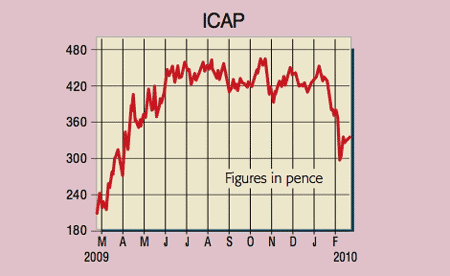
Volatility could be back any day now. With sovereign debt crises erupting around the world, and China threatening to overheat, the major central banks are having to be extra vigilant. So investors are kidding themselves if they think the current calm will last. I’m prepared to wager that, by autumn, the FTSE 100 will be trading in the 4,250-4,750 range. By then investors will realise that despite record low interest rates the real economy can’t stand on its own feet once stimulus packages are withdrawn.
However, the resulting volatility will benefit ICAP, the world’s biggest inter-dealer broker. It makes money by charging commission when it buys and sells financial products (such as interest rate swaps, commodities and fixed income securities) over-the-counter (OTC) on behalf of clients. More turbulence means more deals. The group doesn’t own any underlying assets, but charges to transfer them between other players. That minimises its exposure to counter-party risk.
So why are the shares down 55% over the past two years? First, in the recent, more tranquil market conditions, trading volumes for risky and safe-haven assets have temporarily softened. Second, one outcome of the credit crisis has been law-makers discussing ways to regulate many OTC activities in order to improve transparency. One measure they came up with is to ban short-selling of banks. That led to a tail-off in deal volumes and in ICAP’s revenues. It could even see some, or all, of the firm’s bread-and-butter markets being driven onto regulated exchanges. This is a big concern, unless ICAP converts itself into a quasi-exchange, or steps up its regulatory processes far enough to keep the authorities happy.
ICAP (LSE: IAP), rated a BUY by Merrill Lynch
But just last Tuesday we saw evidence that this is happening when ICAP announced plans to launch a new electronic oil swap trading service with prices posted publicly. Chief executive Michael Spencer thinks ICAP should grow at 8%-10% a year in the medium term. And the introduction of electronic post-trade confirmation and clearing services could expand its OTC market and mirror the effect that the arrival of automatic trading had on the futures, foreign exchange and other securities markets.
The City is worried that trading volumes and margins will drop as ICAP’s clients (often banks and hedge funds) shed risk, and are even forced by regulators to spin-off their proprietary trading desks (where traders bet a bank’s own capital). But Spencer seems ready – he is planning cost-saving measures that include headcount reductions, pushing more business through its electronic platforms (representing 47% of profits) and implementing a “strategic review of its cash equities unit”.
The City is forecasting sales and underlying earnings per share (EPS) of £1.6bn and 31.8p for the year ending March 2010, along with a 17.1p dividend. So the shares trade on an undemanding 10.2 times earnings and pays a generous 5.4% yield. This is almost twice covered by earnings and supported by a solid balance sheet (net debt is £250m). Sure, there are risks, but overall, the stock offers good value to the more adventurous investor. Merrill Lynch has a 515p price target for ICAP.
Recommendation: BUY at 324p
• Paul Hill also writes a weekly share-tipping newsletter, Precision Guided Investments